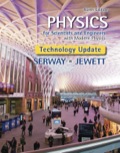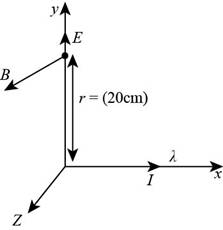
Concept explainers
(a)
The electric field the rod creates at the point ( x = 0 , y = 20.0 cm , z = 0 )
(a)
Answer to Problem 34.6P
Explanation of Solution
Given info: The linear density of the rod is
The value of permittivity of free space is
The figure given below shows the location of the thin rod with respect to axis.

Figure (1)
The formula for the electric field due to long wire is,
Here,
Substitute
Conclusion:
Therefore, the electric field the rod creates at the point
(b)
The magnetic field the rod creates at the point ( x = 0 , y = 20.0 cm , z = 0 )
(b)
Answer to Problem 34.6P
Explanation of Solution
Given info: The linear density of the rod is
The value of the permeability constant is
The expression for the current in the wire is,
Here,
Substitute
Thus, the current in the wire is
The formula for the magnetic flux due to wire is,
Here,
Substitute
Conclusion:
Therefore, the magnetic field the rod creates at the point
(c)
The force exerted on an electron at point ( x = 0 , y = 20.0 cm , z = 0 ) ( 2.40 × 10 8 ) i ^ m / s
(c)
Answer to Problem 34.6P
Explanation of Solution
Given info: The linear density of the rod is
The charge on an electron is
The Lorentz force on the electron is,
Here,
Substitute
Conclusion:
Therefore, the force exerted on an electron at point
Want to see more full solutions like this?
Chapter 34 Solutions
EBK PHYSICS FOR SCIENTISTS AND ENGINEER
- 20. Two small conducting spheres are placed on top of insulating pads. The 3.7 × 10-10 C sphere is fixed whie the 3.0 × 107 C sphere, initially at rest, is free to move. The mass of each sphere is 0.09 kg. If the spheres are initially 0.10 m apart, how fast will the sphere be moving when they are 1.5 m apart?arrow_forwardpls help on allarrow_forwardpls help on thesearrow_forward
- pls help on all asked questions kindlyarrow_forwardpls help on all asked questions kindlyarrow_forward19. Mount Everest, Earth's highest mountain above sea level, has a peak of 8849 m above sea level. Assume that sea level defines the height of Earth's surface. (re = 6.38 × 106 m, ME = 5.98 × 1024 kg, G = 6.67 × 10 -11 Nm²/kg²) a. Calculate the strength of Earth's gravitational field at a point at the peak of Mount Everest. b. What is the ratio of the strength of Earth's gravitational field at a point 644416m below the surface of the Earth to a point at the top of Mount Everest? C. A tourist watching the sunrise on top of Mount Everest observes a satellite orbiting Earth at an altitude 3580 km above his position. Determine the speed of the satellite.arrow_forward
- pls help on allarrow_forwardpls help on allarrow_forward6. As the distance between two charges decreases, the magnitude of the electric potential energy of the two-charge system: a) Always increases b) Always decreases c) Increases if the charges have the same sign, decreases if they have the opposite signs d) Increases if the charges have the opposite sign, decreases if they have the same sign 7. To analyze the motion of an elastic collision between two charged particles we use conservation of & a) Energy, Velocity b) Momentum, Force c) Mass, Momentum d) Energy, Momentum e) Kinetic Energy, Potential Energyarrow_forward
 Principles of Physics: A Calculus-Based TextPhysicsISBN:9781133104261Author:Raymond A. Serway, John W. JewettPublisher:Cengage Learning
Principles of Physics: A Calculus-Based TextPhysicsISBN:9781133104261Author:Raymond A. Serway, John W. JewettPublisher:Cengage Learning Physics for Scientists and EngineersPhysicsISBN:9781337553278Author:Raymond A. Serway, John W. JewettPublisher:Cengage Learning
Physics for Scientists and EngineersPhysicsISBN:9781337553278Author:Raymond A. Serway, John W. JewettPublisher:Cengage Learning Physics for Scientists and Engineers with Modern ...PhysicsISBN:9781337553292Author:Raymond A. Serway, John W. JewettPublisher:Cengage Learning
Physics for Scientists and Engineers with Modern ...PhysicsISBN:9781337553292Author:Raymond A. Serway, John W. JewettPublisher:Cengage Learning
 Physics for Scientists and Engineers: Foundations...PhysicsISBN:9781133939146Author:Katz, Debora M.Publisher:Cengage Learning
Physics for Scientists and Engineers: Foundations...PhysicsISBN:9781133939146Author:Katz, Debora M.Publisher:Cengage Learning Glencoe Physics: Principles and Problems, Student...PhysicsISBN:9780078807213Author:Paul W. ZitzewitzPublisher:Glencoe/McGraw-Hill
Glencoe Physics: Principles and Problems, Student...PhysicsISBN:9780078807213Author:Paul W. ZitzewitzPublisher:Glencoe/McGraw-Hill





